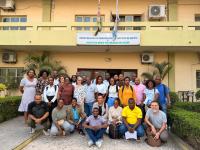The 15th edition of the South-South Cooperation Report shows a 10% growth in cooperation initiatives in 2023 compared to the previous year

The Ibero-American General Secretariat (SEGIB) has presented the 15th edition of the Report on South-South and Triangular Cooperation in Ibero-America within the framework of the 29th Ibero-American Summit of Heads of State and Government, which is being held in Cuenca, Ecuador.
During the presentation, Ecuador's Foreign Minister, Gabriela Sommerfeld, stated that South-South and Triangular Cooperation represents the region's actions and the strong commitment of our countries to overcome existing gaps, promoting solidarity and collaboration from a horizontal perspective. For this reason, she highlighted the launch of the 15th edition of the report, which is consolidated as a useful tool for the region that provides evidence and guidance on cooperation in the region.
This document, which is key for the Ibero-American Community, reflects that in 2023, and after five years of decline, accentuated by the COVID-19 crisis, the total exchanges between Ibero-American countries show signs of recovery close to ten percentage points (9.72%).
The Ibero-American Secretary General, Andrés Allamand, agreed that the report is a benchmark at the international level due to its technical quality and for offering an integrated system of regional statistics on cooperation. "In addition to providing data on the various specific initiatives being promoted in the region, it serves to defend the profound impact of the various cooperation initiatives in which the Ibero-American countries participate."
Furthermore, Allamand stressed the fundamental role of regional cooperation in strengthening multilateralism and integration in the region: “Ibero-America is a supportive region, rich in creative responses and experiences that deserve to be known. This report does not just record figures; it projects the essence of our Community, a community that responds with innovation and commitment to global challenges.”

South-South and Triangular Cooperation of Latin American Countries Grows Again
The final figure of 914 exchanges in 2023 exceeds the 833 in 2022, but is still less than 1,000 annual initiatives, remaining below pre-crisis levels and far from the peaks reached in 2013 and 2014. This increase confirms the resilience and adaptability of Ibero-American countries in the face of global challenges, projecting Ibero-America as a model of inclusive and supportive cooperation.
Broadly speaking, the document describes the growth of a cooperation model, the increasing incorporation of more actors and a continued commitment to innovation.
Milestones of consolidated cooperation
- The 15th edition of the Report shows that Bilateral South-South Cooperation continues to be the most important, accounting for 3/4 of all cooperation developed in the region , while the growth of Triangular Cooperation has been very significant, doubling its relative weight in this period.
- From 2007 to 2023, more than half of the Ibero-American countries exceeded 1,000 initiatives, with Mexico and Colombia reaching 2,000. These exchanges cover various sectors, with Health and Agriculture being the most prominent with more than 1,200 projects each. However, crucial areas for the future development of the region, such as Science and Technology, represent only 3% of the total and show a space of opportunity for cooperation in the coming years.
- Following the sharp decline recorded by the global pandemic, Spain's Triangular Cooperation has seen successive increases that have brought its initiatives to 53 in 2022-2023, making it the second largest provider, followed by Germany and the EU.
More actors and a more present Global South
The report reflects an increasingly open and diversified model of cooperation . The 10,432 initiatives carried out between 2007 and 2023 have involved the participation of 239 countries and organizations. The 22 Ibero-American countries have partnered at different times with 135 countries from other regions of the Global South, 37 countries from the North and 81 multilateral organizations.
Since the approval of the 2030 Agenda for Sustainable Development, the participation of different actors has increased, but was slowed by the impact of COVID-19, which reduced the average figure, which is still around 150 per year.
The Secretary for Ibero-American Cooperation, Lorena Larios, has highlighted the impact of this change: “Triangular collaboration strengthens our capacity to act and allows us to move towards more equitable and sustainable development. This type of cooperation encourages the exchange of experiences and knowledge at levels that were previously difficult to imagine.”
Future prospects and challenges
Ibero-American cooperation has been a key tool in addressing global challenges such as the health crisis, food insecurity and climate change. In the coming years, SEGIB's strategic focus will be on strengthening exchanges in priority sectors, such as the Environment and Science and Technology, which require greater investment to address global challenges.
In the report's foreword, Secretary Allamand refers to the power of collaboration to impact communities: "The pooling of our capabilities and knowledge makes us stronger as a region. This report is a clear example of the instruments that make this union possible, which not only helps to build it, but also to make it visible."
The report also highlights the inclusive and collaborative nature of Ibero-American cooperation , positioning the region as a benchmark in the implementation of the Sustainable Development Goals (SDG).
"We will continue to support innovative and efficient cooperation that will allow our countries to be protagonists in the global debate on development," concluded Allamand, reaffirming SEGIB's commitment to a more integrated, equitable and sustainable Ibero-America.
Innovation in cooperation: the commitment to AI
SEGIB is evaluating the incorporation of artificial intelligence (AI) tools to improve data processing and analysis, which would allow the organization and Ibero-American countries to monitor cooperation initiatives more accurately and efficiently. This commitment responds to SEGIB's vision of strengthening Ibero-American leadership in the field of global cooperation.
"We are very attentive to the potential of artificial intelligence to optimize our work. This effort will not only strengthen our leadership, but will also open up new opportunities to innovate in the management of cooperation," added Lorena Larios.
- Access the full report
- Click here to access photographs from the presentation of the South-South Cooperation Report
- Access here photographs of South-South and Triangular Cooperation projects
- Click here to access the infographic on the 15th anniversary of the South-South and Triangular Cooperation report



